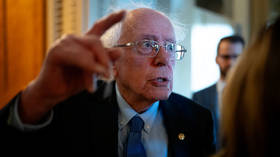US school loses $100 million donation over Israel row

Wall Street money manager Ross Stevens has canceled his $100 million donation to the University of Pennsylvania and demanded a change in leadership after the elite school’s president declined to categorically condemn calls for genocide against Jews during a congressional hearing earlier this week.
Stevens’ firm, Stone Ridge Asset Management, notified the university of its decision to revoke his donation on Thursday. The executive also told Stone Ridge employees of his plan to cancel the shares that he had donated to Penn, citing the reputational damage caused by being associated with the school.
The move came two days after Penn’s president, Liz Magill, and the presidents of Harvard University and the Massachusetts Institute of Technology (MIT) gave controversial testimony in a congressional hearing regarding rising anti-Semitism on American campuses amid the Israel-Hamas war. Asked whether calling for genocide against Jewish people would violate Penn’s code of conduct, Magill replied, “It is a context-dependent decision.”
Stevens was appalled by Penn’s stance, his lawyers said in a letter to the university. Because the school apparently violated Stone Ridge’s policies against discrimination and harassment, the firm has cause to retire Penn’s shares, which are currently valued at around $100 million, lawyers Neil Barr and Dana Seshens wrote.
Stevens, a Penn alumnus, told employees that the shares would be rescinded “absent a change in leadership and values” at the school “in the very near future.” He added, “I love Penn and it is important to me, but our firm’s principles are more important.”
Magill posted a video on Wednesday to clarify her congressional testimony, saying her statement was focused on the university’s policies regarding freedom of speech. “I was not focused on, but I should have been, the irrefutable fact that a call for genocide of Jewish people is a call for some of the most terrible violence human beings can perpetrate.”
Stevens is among the noteworthy graduates of Penn’s prestigious Wharton School of Business, which boasts such famous alumni as Tesla CEO Elon Musk, former US President Donald Trump and legendary investor Warren Buffett. The Wharton Board of Advisors called on Wednesday for Magill to resign. “In light of your testimony yesterday before Congress, we demand the university clarify its position regarding any call for harm to any group of people immediately, change any policies that allow such conduct with immediate effect, and discipline any offenders expeditiously,” the board said.
Large-scale protests have sprung up on US campuses since the Israel-Hamas war broke out in October, in many cases demanding the liberation of Palestine and a ceasefire in Gaza. Reports of harassment or violence against both Jews and Muslims in the US have increased amid the rising tensions. Jewish students at such schools as Columbia University and Cornell University have claimed that they feel unsafe as some protestors call for their deaths.
Stevens made his donation, given in the form of Stone Ridge partnership units, to Penn in 2017. The gift was made to fund the Stevens Center for Innovation in Finance at Wharton. Earlier this year, he reportedly withdrew a separate $100 million donation to the school and gave it to his other alma mater, the University of Chicago, because he believed Penn was prioritizing diversity programs over academic excellence.













